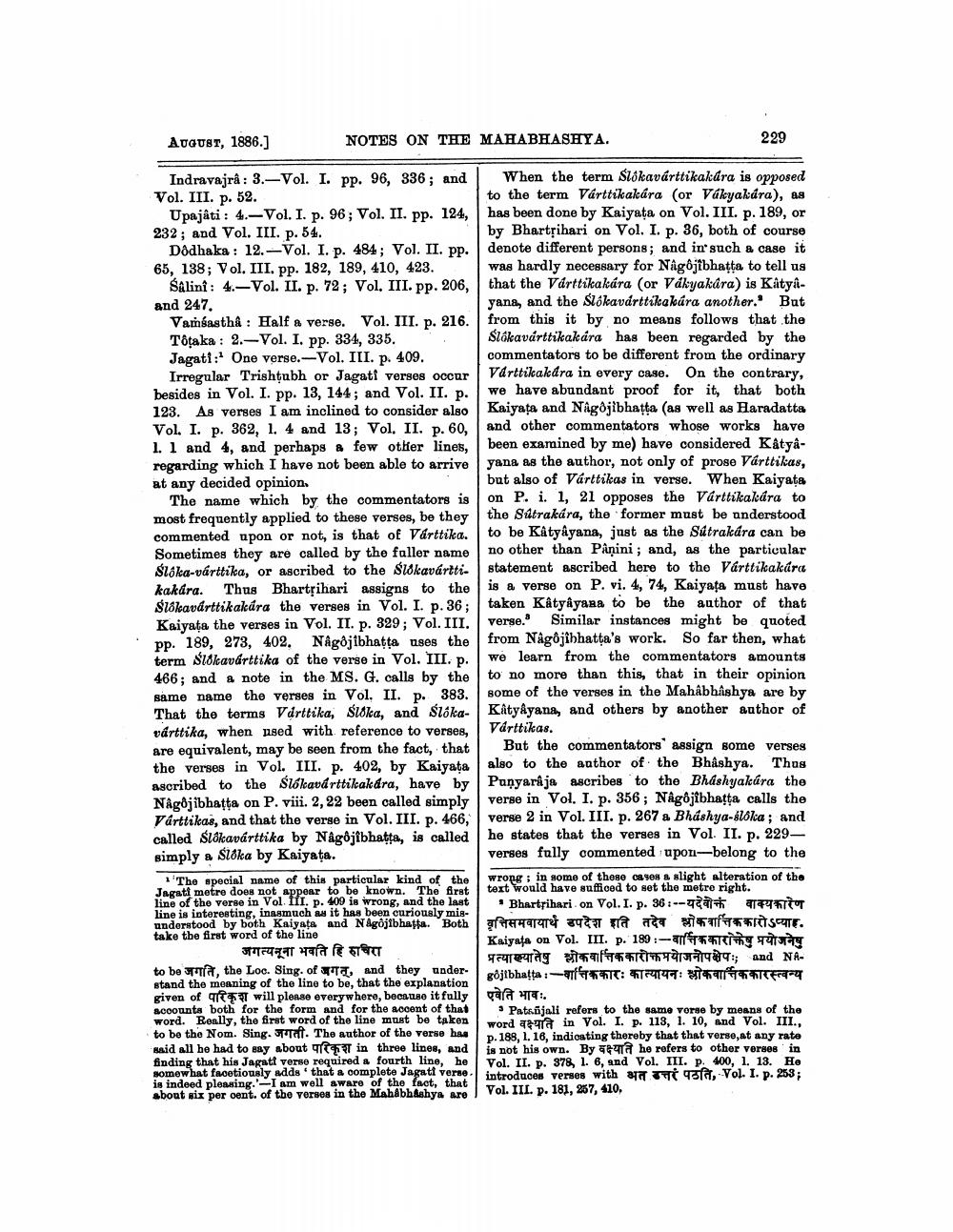________________
AUGUST, 1886.]
NOTES ON THE MAHABHASHYA.
229
Indravajrå : 3.-Vol. I. pp. 96, 336; and When the term Siskavárttikakdra is opposed Vol. III. p. 52.
to the term Várttikakára (or Vákyakára), as Upajâti: 4.-Vol. I. p. 96; Vol. II. pp. 124, has been done by Kaiyața on Vol. III. p. 189, or 232; and Vol. III. p. 54.
by Bhartihari on Vol. I. p. 36, both of course Dodhaka : 12.-Vol. I. p. 484; Vol. II. pp. denote different persons; and in such a case it 65, 138; Vol. III. pp. 182, 189, 410, 423. was hardly necessary for Nagôjibhatta to tell us
Salinî : 4.-Vol. II. p. 72; Vol. III. pp. 206, that the Vårttikakára (or Vdkyakára) is Katyaand 247.
yana, and the Slókavárttikakura another.' But Vamsastha : Half a verse. Vol. III. p. 216. from this it by no means follows that the Totaka : 2.-Vol. I. pp. 334, 335.
Slákavárttikakára has been regarded by the Jagati:" One verse.-Vol. III. p. 409. commentators to be different from the ordinary
Irregular Trishtubh or Jagati verses occur besides in Vol. I. pp. 13, 144; and Vol. II. p. we have abundant proof for it, that both 123. As verses I am inclined to consider also Kaiyata and Nagôjibhatta (as well as Haradatta Vol. I. p. 362, 1.4 and 13; Vol. II. p. 60, and other commentators whose works have 11 and 4, and perhaps a few other lines, been examined by me) have considered Katy regarding which I have not been able to arrive yana as the author, not only of prose Várttikas, at any decided opinion.
but also of Várttikas in verse. When Kaiyata The name which by the commentators is on P. i. 1, 21 opposes the Várttikakdra to most frequently applied to these verses, be they the Satrakdra, the former must be understood commented upon or not, is that of Varttika. to be Katyayana, just as the Sátrakára can be Sometimes they are called by the faller name no other than Panini ; and, as the particular Ślóka-várttika, or ascribed to the slákavártti. statement ascribed here to the Värttikakarat kakára. Thus Bhartsihari assigns to the is a verse on P. vi. 4, 74, Kaiyaţa must have siskavarttikakára the verses in Vol. I. p. 36; taken Kâtyâyana to be the author of that Kaiyata the verses in Vol. II. p. 329; Vol. III. verse. Similar instances might be quoted pp. 189, 273, 402. Nagôjibhatta uses the from Nagôjihhatta's work. So far then, what term Siókavárttika of the verse in Vol. III. p. we learn from the commentators amounts 466; and a note in the MS. G. calls by the to no more than this, that in their opinion same name the verses in Vol. II. p. 383. some of the verses in the Mahâbhâshya are by That the terms Vdrttika, sloka, and flóka- Katyayana, and others by another author of várttika, when used with reference to verses, vårttikas. are equivalent, may be seen from the fact that But the commentators' assign some verses the verses in Vol. III. p. 402, by Kaiyata also to the author of the Bhashya. Thus ascribed to the $lákavárttikakára, have by Punyaraja ascribes to the Bhashyakúra the Nâgôjibhatta on P. viii. 2,22 been called simply verse in Vol. I. p. 356; Någôjibhatta calls the Várttikas, and that the verse in Vol. III. p. 466, verse 2 in Vol. III. p. 267 a Bháshya-sloka; and called szökavárttika by Nâgôjfbhatta, is called he states that the verses in Vol. II. p. 229– simply a Sloka by Kaiyata.
verses fully commented upon-belong to the * The special name of this particular kind of the wrong: in some of these cases a slight alteration of the Jagati metre does not appear to be known. The first text would have sufficed to set the metre right. line of the verse in Vol. II. p. 409 is wrong, and the last
Bhartrihari on Vol. I. p. 36:-- line is interesting, inasmuch as it has been curiously misunderstood by both Kaiyata and Nagôjbhara. Both वृत्तिसमवायार्थ उपदेश इति तदेव श्लोकवात्तिककारोऽप्याह. take the first word of the line
Kaiyata on Vol. III. p. 189:-afi a जगत्यनूना भवति हि रुचिरा
eragina
and NAto be fat, the Loc. Sing. of Ta, and they under
gojibhafta 1- TT: :
TOPY stand the meaning of the line to be, that the explanation given of will please everywhere, because it fully एवेति भावः. accounts both for the form and for the accent of that
Patañjali refers to the same voree by means of the word. Really, the first word of the line must be taken
word in Yol. I. p. 113, 1. 10, and Vol. III., to be the Nom. sing. traff. The author of the verse has
p. 188, 1. 16, indicating thereby that that verse at any rate mid all he had to say about it in three lines, and
is not his own. By A he refers to other verses in finding that his Jagatt verse required a fourth line, heV ol. II. p. 378 1. 6, and Vol. III. p. 400, 1. 13. Ho somewhat facetiously adds that a complete Jagati verse introduces verses with a TY Tua, Vol. I. p. 203; is indoed pleasing. I am well aware of the fact, that about six per cent. of the verses in the Mahabh Ashya are Vol. III. p. 181, 257, 410,




